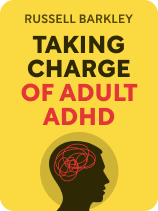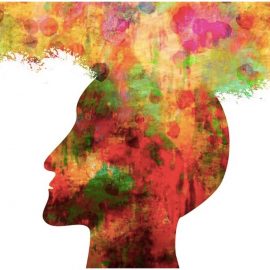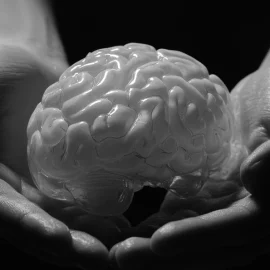

This article is an excerpt from the Shortform book guide to "Taking Charge of Adult ADHD" by Russell Barkley. Shortform has the world's best summaries and analyses of books you should be reading.
Like this article? Sign up for a free trial here.
Do you have or know someone who has ADHD? What’s Taking Charge of Adult ADHD by Russell A. Barkley about?
Attention-Deficit/Hyperactivity Disorder (ADHD) isn’t a diagnosis that’s restricted to childhood. In Taking Charge of Adult ADHD, Russell A. Barkley explores how ADHD affects adults and the treatment options they have to manage it.
Read below for a brief overview of Taking Charge of Adult ADHD.
Overview of Taking Charge of Adult ADHD
For too long, conventional wisdom suggested that Attention-Deficit/Hyperactivity Disorder (ADHD) was a diagnosis that only applied in childhood. Now we understand that many adults experience ADHD, though not necessarily in the same ways as children. Adults with ADHD struggle to cultivate time management and organization skills. Often, they’ll fail to stick to schedules, fulfill commitments, and maintain enough focus to achieve their goals. If you’re an adult with ADHD, even if it hasn’t been officially diagnosed, your ongoing struggles might lead you to internalize an undeserved sense of inadequacy, compounded by the fear that you’ll continually disappoint yourself and others in your life.
But it doesn’t have to be that way. In Taking Charge of Adult ADHD, Russell A. Barkley draws on nearly 50 years of experience to clarify what ADHD is, how it affects adults, and how to effectively manage ADHD through medication and lifestyle strategies that can help put you on an even footing with your loved ones, colleagues, and other people in your life.
Barkley holds a Ph.D. in clinical psychology from Bowling Green State University and has spent his professional career studying ADHD’s causes, effects, and most effective treatments. He’s authored several definitive works on the subject, including books for doctors, teachers, parents, and loved ones of people who have ADHD.
What Is ADHD?
Many people struggle with impulsivity, keeping commitments, and managing their time, but for most, it doesn’t rise to the level of a clinical condition that significantly impairs how they live. That’s precisely what ADHD is—a neurological condition that inhibits how your brain processes information, regulates emotions, and predicts the consequences of your actions. We’ll start by discussing how ADHD is defined, where it comes from, and how it’s diagnosed.
According to Barkley, Attention-Deficit/Hyperactivity Disorder is a condition arising from a biological deficiency of dopamine and norepinephrine—two chemicals commonly found in the brain. These chemicals are both neurotransmitters that govern how nerve cells respond to stimuli. When they’re lacking, certain mental functions don’t work, such as those involved in controlling impulses, making decisions, and planning ahead. People with ADHD also exhibit slower development and less neural activity in the regions of the brain associated with those functions. The root cause may be genetic—the risk for ADHD can run in families—but ADHD can sometimes be traced to brain injuries early in life or even during prenatal development.
Barkley is careful to point out that having ADHD isn’t anyone’s fault. Your symptoms don’t reveal that you lack moral fiber, and they aren’t something you can make go away by force of will or self-motivation. Likewise, ADHD symptoms don’t result from either lax or too-strict parenting, nor are they caused by sugar, caffeine, video games, or any of the other myths bandied about by the uninformed from time to time. You can’t help that you have ADHD; you can only control what you do with that knowledge once you’ve been diagnosed.
Diagnosing ADHD
In the overwhelming majority of cases, ADHD symptoms begin during people’s formative years. However, while some are diagnosed early, others don’t learn that they have ADHD until well into adulthood. ADHD disrupts your ability to function in numerous ways, but the world of an adult is starkly different than the world of a child—as such, Barkley says that ADHD presents itself differently in adults than in children. To diagnose adult ADHD, doctors assess the following range of factors:
- You’re easily distracted and find it challenging to focus on tasks or activities. For example, during meetings at work or social gatherings, you constantly check your phone, go off on conversational tangents, or get lost in your thoughts.
- You make impulsive decisions and find it difficult to stop unproductive behaviors. For instance, you might frequently buy things you don’t need without considering your budget, or you might spend every morning scrolling through social media instead of starting your work.
- You have a hard time following lists of instructions or doing the steps in the right order. For example, you assemble furniture without reading the instructions first, or you might mix up the sequence of steps in preparing a recipe.
- You struggle to honor commitments. You forget about plans you’ve made with friends, fail to complete tasks you’ve promised to do, and frequently show up late to appointments.
- You have trouble engaging in leisure activities. You prefer high-intensity activities that involve constant movement because you’re too restless to participate in relaxing pastimes.
- You drive too fast. You have a hard time following the rules of the road, are frequently pulled over and ticketed, and may have a history of automobile accidents.
To be clear, most people can lay claim to some or all of the above-listed symptoms from time to time, but in ADHD, these symptoms are persistent and severe enough that they derail your ability to lead a normal life. To receive an ADHD diagnosis, you must have experienced symptoms for at least six months, and they had to have begun before the age of 16. Barkley says that if your symptoms started during adulthood, they’re probably due to something other than ADHD.
For some people, being diagnosed with ADHD can be freeing—at last they have an explanation for their struggles. The bad news is that ADHD rarely comes alone. Four out of every five people with ADHD have accompanying psychiatric problems, including antisocial behavior, anxiety, depression, and problems with substance abuse. It’s possible that some of these are caused by the stress of living with ADHD, but this is why Barkley says it’s important to be properly diagnosed—it’s only when you understand your challenges in full that you and your doctors will be able to tackle them head-on. We’ll cover treatment options in the second half of this guide, but first, let’s explore what having ADHD as an adult is like.
The Symptoms of Adult ADHD
The common, public image of ADHD is that of a hyperactive, defiant child, but that is a vast oversimplification that ignores the deeper issues at work that follow people with ADHD into their adult lives. Barkley writes that adults with ADHD struggle with impaired cognitive functions that affect how their brains process information and regulate their emotions. This impairment takes the form of an inability to inhibit your actions, think beyond the present moment, and envision the likely consequences of any course of action you may take.
Lack of Impulse Control
The most clear-cut symptom of adult ADHD is the inability to consciously avoid impulsive actions or to know how to appropriately respond to situations—for example, knowing when not to speak during a conversation when your impulse may be to interrupt someone else. Barkley explains this symptom’s neurological cause, how impulsive behavior can overwhelm your life, and how impulsivity affects your emotions.
In people without ADHD, the brain responds to external stimuli, such as phone notifications or blaring car horns, by pausing for a moment to generate a response, gauging what level of action to take, or ignoring the stimulus entirely. However, Barkley explains that in ADHD, the parts of your brain in charge of the “stop, think, then act” cycle are starved of the neurotransmitters they need to properly function. What happens, then, is that every stimulus leads to immediate action—such as checking your phone or steering out of traffic to see why horns are honking.
In everyday life, ADHD’s stimulus-to-action cycle manifests as impulsive behavior and a lack of inhibitions. Your brain literally can’t stop itself. At work, you’ll find it hard to complete any task when every potential distraction around you demands an immediate response. In social settings, you may talk excessively, interrupt other people, or go off on unrelated tangents because you can’t self-regulate your speech. When shopping, you probably spend too much on impulse buys because your brain can’t interrupt the signal between seeing something nice and sticking it in your cart. When compounded, all these impulsive acts can snowball into a debilitating torrent of out-of-control, self-sabotaging behavior.
In tandem with ADHD’s effects on controlling impulsive actions, it can also impair your ability to regulate emotions. Barkley explains that when your brain isn’t able to pause and process feelings, they come out as impulsive outbursts. This often leads to inconsistent emotional responses, which may be inappropriate or exaggerated in certain situations. For example, you might feel intensely angry or sad in response to a minor inconvenience, possibly expressing your exasperation by yelling or throwing objects. Likewise, you’ll sometimes laugh harder at a joke that others perceive as only mildly amusing. When expressing emotions appropriately is a challenge, the results are communication breakdowns and difficulty connecting to others.
Poor Time-Sense
Coupled with the lack of immediate self-control that ADHD causes, you may also have an impaired relationship with time. Barkley discusses how ADHD affects your sense of the present, the past, and the future, as well as how that can impact your everyday life.
Barkley argues that an important function of the “stop, think, then act” mental process is that it lets you build a mental image of the present, compare it to memories of the past, and make best-guess predictions of the future. When ADHD interrupts that process, you have difficulty judging the passage of time, and because you’re not aware of time, you can’t consciously manage it. You have problems estimating how much time things will take, so you’ll consistently underestimate how much time you need. You’ll miss deadlines and frequently run late for appointments. The people in your life may think you’re unreliable, when really you’re simply lacking a sense of time that most other people take for granted.
ADHD doesn’t just impair your ability to measure time passing in the present—it also impacts your perception of time on a larger scale. Barkley states that because of ADHD, your recall of past events may be impaired, as well as your ability to envision the future. You may have trouble remembering specific details of your life, such as important conversations or the results of past behaviors. This becomes a struggle when you need to plan long-term projects or make decisions based on future consequences: When you can’t remember your experiences, you can’t reflect on and learn from them, and if you find it hard to think about the future, you can’t consciously plan for it.
Impaired Higher Functions
Weakened inhibitions, a spotty memory, and an impaired sense of time aren’t ADHD’s only symptoms. Barkley lists several other mental functions that ADHD hinders in adults. These include the “inner voice” that lets you motivate yourself and work through problems, the ability to encode lessons learned into language, and the ability to learn from reading and observation.
Barkley writes that adults with ADHD have trouble engaging in internal dialogue. Self-talk plays a vital role in problem-solving, focused contemplation, and creating internal motivations for yourself. However, your tendency to react to every distraction makes it hard to think through options, evaluate outcomes, or convince yourself to engage in productive behaviors that won’t provide an immediate reward. If you can’t maintain constructive self-talk, you can’t consciously assess the consequences of different decisions. If you can’t verbally motivate yourself, you’ll struggle to start or complete tasks that require sustained effort and concentration. Instead, your inner voice may be like your outer voice, constantly flitting from one tangent to the next.
Just as ADHD impairs your memory of events, as we discussed in the previous section, ADHD weakens your ability to remember and organize written and verbal information, such as driving directions, a list of instructions, or important details like how often to take medications. This is a problem, since if you can’t remember information, you can’t consciously act on it. Barkley states that adults with ADHD often have a hard time retaining and comprehending information that they read or hear, such as trying to follow the plot of a book or the point a speaker makes in a lecture. ADHD even inhibits your ability to learn vicariously through observation. All of this makes any style of learning problematic for adults with ADHD.
Medications to Treat ADHD
Thankfully, ADHD can be dealt with. Barkley states unequivocally that medication is the most effective way to treat adult ADHD symptoms. Here, we’ll look at how ADHD medications work and the pros and cons of taking stimulants versus non-stimulant medications.
As previously discussed, ADHD results from an imbalance of the neurochemicals dopamine and norepinephrine, both of which are pivotal in processing information and regulating emotions. ADHD medications work by correcting the neurochemical imbalance underlying the disorder. By doing so, these medications nullify or reduce ADHD symptoms, leading to improved focus, self-awareness, and self-control. However, Barkley says that to determine the correct medication for you, as well as what dosage you should take, requires working closely with your physician, being open with them about all of your symptoms, and being patient until you and your doctor agree upon the optimal treatment plan.
Behavioral Strategies to Manage ADHD
Though medication is your first line of defense against ADHD, throughout your life you’ve probably developed unhelpful behavior patterns (such as ignoring the rules of the road) because of your ADHD symptoms. Once your medication has begun to do its work, you may want to try to develop new habits to counter the ones ingrained by ADHD. Barkley provides tips on how to take advantage of your reduced symptoms to retrain your brain so it can work to your benefit. These include learning to pause before acting, using visualization techniques to better understand the flow of time around you, and taking advantage of some cognitive tricks to give you a leg up on planning and problem-solving.
Taking a Pause
The first trick to overcoming ADHD-influenced habits is to find ways to pause and reflect in situations where you’re used to behaving impulsively. As a person with ADHD, you may find that easier said than done. Barkley acknowledges that trying to fight your impulse to act isn’t likely to work, so instead he suggests that you think about ways to redirect that impulse when it happens. If you can satisfy your reactive urge by deflecting it into a harmless action, such as scratching your head or tapping your fingers, that momentary pause might give you time to consider the most appropriate course of action to take next.
Visualization
Of course, being able to see behavior patterns in your past and planning what to do about them in the future are two things that ADHD sabotages, as we discussed earlier in this guide. This makes it hard to analyze the past and predict the results of your actions in the future. Therefore, Barkley recommends visualization techniques that can strengthen your memory’s muscles. These range from adopting useful visual cues, exercising your different types of memory, and imagining the positive outcomes of your efforts.
Motivation and Problem-Solving
Not being able to envision the future creates real problems for people with ADHD, especially when it comes to motivation and problem-solving. As with navigating your challenges around short-term impulse control and decision-making, planning for the future requires activating the higher functions of the brain that ADHD normally suppresses. Tricks to jump-start a recalcitrant brain include visualizing positive outcomes, breaking tasks down into manageable chunks, and involving all of your senses in problem-solving, not just trying to work from pure imagination.
The trouble with trying to change your behavior is that it takes time to see any results, and as a person with ADHD, you may grow impatient with your progress or worse—you might start to beat yourself up for not being able to see results fast enough. This is why Barkley says it’s important to imagine the positive consequences that will result from engaging in productive behaviors. This can help generate uplifting emotions that motivate you to take the necessary steps to achieve your goals.
Accept Your ADHD
No matter what medications and lifestyle strategies you find useful, Barkley is adamant that to truly manage your ADHD, rather than letting it manage you, is to accept that your ADHD is part of who you are as a person. This doesn’t mean you should accept it as a gift, but neither should you ever feel ashamed about your diagnosis. If you acknowledge it as one of your imperfections, of which we all have many, then you’ll be able to work with your condition, rather than wasting fruitless time working against it.
Barkley says you might find it helpful to approach your ADHD with a sense of humor. Though this, like any other strategy, may not work for everyone, being able to laugh at your struggles can help you maintain a positive attitude as you navigate the challenges arising from your symptoms. If you can face difficulties related to ADHD and are able to find humor in the situation, you’ll avoid fixating on your mistakes, being self-critical, and becoming mired in negative self-judgment. Ultimately, this approach can empower you to maintain resilience and focus on moving forward.

———End of Preview———
Like what you just read? Read the rest of the world's best book summary and analysis of Russell Barkley's "Taking Charge of Adult ADHD" at Shortform.
Here's what you'll find in our full Taking Charge of Adult ADHD summary:
- The various treatment options for ADHD in adults
- How to accept ADHD as a part of your life
- What ADHD can look like in undiagnosed adults






